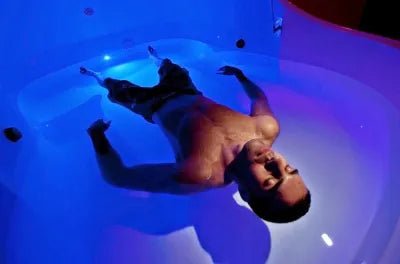Sensory deprivation float therapy can aid and support mind and body relaxation, improved REM sleep patterns, decreased stress, anxiety, and pain management. as well as other health benefits known to medical professionals we'll discuss in as we move further into the world of mental fitness biohacking.
A sensory deprivation tank/pod also called an isolation tank or flotation tank, is used for restricted environmental stimulation therapy (REST). It is a dark, soundproof tank that is filled with a foot or less of salt water.
The first tank was designed in 1954 by John C. Lilly, an American physician and neuroscientist. He designed the tank to study the origins of consciousness by cutting off all external stimuli.
His research took a controversial turn in the 1960s when he began experimenting with sensory deprivation while under the effects of LSD, a hallucinogenic, and ketamine, a fast-acting anesthetic that is known for its ability to sedate and create a trance-like state.
In the 1970s, commercial float tanks were created and began being studied for possible health benefits.
Locating sensory deprivation therapy sessions these days, has become easy, with float centers and spas offering floatation therapy world wide.
Their increase in popularity may be due in part to the
Sensory deprivation possibilities
In a sensory deprivation tank, the water is heated to match your skin's temperature and is highly saturated with Epsom salt, also known as magnesium sulfate. This high salt concentration allows for effortless floating by providing buoyancy.
Once inside the tank, you experience a complete disconnection from external stimuli. The tank's lid or door is closed, cutting off all sound, sight, and the sensation of gravity. This isolation creates a unique environment where you float weightlessly in utter silence and darkness, facilitating the potential for deep relaxation.
Sensory deprivation tank therapy is believed to induce various effects on the brain. Some individuals report experiencing hallucinations, while others claim enhanced creativity during their sessions. These effects highlight the profound impact that sensory deprivation can have on the mind and its potential to unlock new states of consciousness.
Do you have hallucinations in a sensory deprivation tank?
Numerous individuals have shared accounts of experiencing hallucinations while in sensory deprivation tanks. Extensive research conducted over the years has confirmed that sensory deprivation indeed elicits psychosis-like experiences.
In a noteworthy study conducted in 2015, a group of 46 participants was divided into two categories based on their predisposition to hallucinations. The results revealed that sensory deprivation triggered comparable experiences in both the high- and low-prone groups. Moreover, it was observed that the frequency of hallucinations increased specifically among individuals classified in the high-prone group. This study provides valuable insights into the influence of sensory deprivation on hallucinatory phenomena and its differential impact based on individual susceptibility.
Will It make you more creative
Floating in a sensory deprivation tank has shown potential for enhancing creativity, as mentioned in a 2014 article published in the European Journal of Integrative Medicine. Several studies have indicated that this practice can foster an increase in originality, imagination, and intuition. These cognitive shifts have the potential to unlock new levels of creativity within individuals, providing a unique avenue for exploring and expressing innovative ideas.
Can it improve concentration and focus?
While the majority of existing research on sensory deprivation is dated, there is evidence suggesting that it can enhance focus, concentration, and promote clearer, more precise thinking. These cognitive benefits have been associated with improved learning abilities and enhanced performance across various educational and professional domains. Although further research is needed to fully understand the extent of these effects, initial findings suggest the potential for sensory deprivation to positively impact cognitive functioning and achievement in academic and career settings.
Does it improve athletic performance?
Extensive documentation supports the diverse effects of sensory deprivation tank therapy on athletic performance. Notably, a study involving 24 college students revealed its effectiveness in accelerating recovery after rigorous physical training by reducing blood lactate levels.
Furthermore, a separate study conducted in 2016, which involved 60 elite athletes, demonstrated that sensory deprivation therapy enhanced psychological recovery subsequent to intense training and competitive events. These findings highlight the potential of sensory deprivation as a valuable tool in optimizing athletic performance, aiding in both physical and mental recuperation for athletes at various levels of training and competition.

